|
|
|
Sort Order |
|
|
|
Items / Page
|
|
|
|
|
|
|
| Srl | Item |
| 1 |
ID:
099754


|
|
|
|
|
| Summary/Abstract |
Existing scholarship on the Iraq War decision-making process generally treats the event as a logical extension of pre-existing ideas and policies. This paper considers the Bush administration's decision to absorb Iraq into the broader War on Terror as a deviation from long-held views of Saddam Hussein. I argue that the decision to incorporate Iraq into the wider post 9/11 mission was pathologically driven by groupthink, which caused a shift in the administration's view of Saddam from a troubling dictator to an existential threat to US security. Therefore, groupthink can simultaneously explain the defects in the decision-making process and the shift from cautious restraint to accelerated urgency with respect to US relations with Iraq.
|
|
|
|
|
|
|
|
|
|
|
|
|
|
|
|
| 2 |
ID:
100262
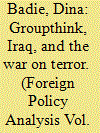

|
|
|
|
|
| Publication |
2010.
|
| Summary/Abstract |
Existing scholarship on the Iraq War decision-making process generally treats the event as a logical extension of pre-existing ideas and policies. This paper considers the Bush administration's decision to absorb Iraq into the broader War on Terror as a deviation from long-held views of Saddam Hussein. I argue that the decision to incorporate Iraq into the wider post 9/11 mission was pathologically driven by groupthink, which caused a shift in the administration's view of Saddam from a troubling dictator to an existential threat to US security. Therefore, groupthink can simultaneously explain the defects in the decision-making process and the shift from cautious restraint to accelerated urgency with respect to US relations with Iraq.
|
|
|
|
|
|
|
|
|
|
|
|
|
|
|
|
| 3 |
ID:
099759
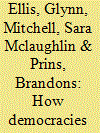

|
|
|
|
|
| Summary/Abstract |
Some studies find that democratic states are more amenable to third party forms of conflict management, while other studies indicate that democracies are able to resolve contentious issues on their own through bilateral negotiations. Using data from the Issue Correlates of War (ICOW) Project, the authors investigate peaceful and militarized conflict management strategies that democratic states employ to resolve contentious issues. Theoretically, the authors focus on how militarized conflict history, relative capabilities, and issue salience influence the tools of conflict management employed by democratic states. Empirical analyses suggest that democratic dyads employ bilateral negotiations more often to resolve contentious issues when the issue has not been militarized previously, when the issue is more salient, and when democratic states face equal adversaries. Democratic dyads seek out nonbinding third party settlement more frequently in situations of power preponderance than nondemocratic dyads, although binding forms of third party settlement occur most often in relatively equal democratic dyads. When it comes to the use of force, democratic states are much less likely than their authoritarian counterparts to militarize an issue claim when little or no armed conflict characterizes the relationship. However, democratic leaders show a willingness to confront force with force. After one militarized dispute, democratic states are no different in their conflict propensity than autocratic states.
|
|
|
|
|
|
|
|
|
|
|
|
|
|
|
|
| 4 |
ID:
100272


|
|
|
|
|
| Publication |
2010.
|
| Summary/Abstract |
Some studies find that democratic states are more amenable to third party forms of conflict management, while other studies indicate that democracies are able to resolve contentious issues on their own through bilateral negotiations. Using data from the Issue Correlates of War (ICOW) Project, the authors investigate peaceful and militarized conflict management strategies that democratic states employ to resolve contentious issues. Theoretically, the authors focus on how militarized conflict history, relative capabilities, and issue salience influence the tools of conflict management employed by democratic states. Empirical analyses suggest that democratic dyads employ bilateral negotiations more often to resolve contentious issues when the issue has not been militarized previously, when the issue is more salient, and when democratic states face equal adversaries. Democratic dyads seek out nonbinding third party settlement more frequently in situations of power preponderance than nondemocratic dyads, although binding forms of third party settlement occur most often in relatively equal democratic dyads. When it comes to the use of force, democratic states are much less likely than their authoritarian counterparts to militarize an issue claim when little or no armed conflict characterizes the relationship. However, democratic leaders show a willingness to confront force with force. After one militarized dispute, democratic states are no different in their conflict propensity than autocratic states.
|
|
|
|
|
|
|
|
|
|
|
|
|
|
|
|
| 5 |
ID:
100270
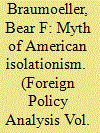

|
|
|
|
|
| Publication |
2010.
|
| Summary/Abstract |
International relations scholarship often describes America's foreign policy tradition as having isolationist tendencies or an isolationist dimension, a characterization derived most directly from American security policy in the 1920s and 1930s. This article offers a critique of this characterization. American diplomacy in the 1920s was subtle but ambitious and effective. American policy in the years leading up to the bombing of Pearl Harbor was in fact quite responsive to events on the European continent. In short, American isolationism is a myth.
|
|
|
|
|
|
|
|
|
|
|
|
|
|
|
|
| 6 |
ID:
099758


|
|
|
|
|
| Summary/Abstract |
International relations scholarship often describes America's foreign policy tradition as having isolationist tendencies or an isolationist dimension, a characterization derived most directly from American security policy in the 1920s and 1930s. This article offers a critique of this characterization. American diplomacy in the 1920s was subtle but ambitious and effective. American policy in the years leading up to the bombing of Pearl Harbor was in fact quite responsive to events on the European continent. In short, American isolationism is a myth.
|
|
|
|
|
|
|
|
|
|
|
|
|
|
|
|
| 7 |
ID:
100264
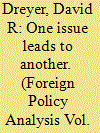

|
|
|
|
|
| Publication |
2010.
|
| Summary/Abstract |
Rather than competition over one issue or another (such as territory or status) leading to war, in this study it is argued that war is often likely the result of an issue spiral-a dynamic process in which tension increases as multiple issues accumulate. Once an initial issue disagreement is established, the development of enemy images may cause states to view the "other's" behavior and intentions in relation to additional issues as threatening. States may subsequently seek to gain an advantage on a new issue in order to prevent one's competitor from doing so, or in order to gain leverage on other issues. A state's aggressive actions in relation to new issues tend to reinforce their rival's perceptions that the state has aggressive intentions in relation to earlier established disagreements, further increasing tension. Issue accumulation, furthermore, increases the stakes of competition, which increases the likelihood that states will be willing to bear the costs of war seeking favorable issue settlement. As tension heightens and the rationality of engaging in large-scale militarized conflict increases, a state may initiate war if a rival presses its demands on an issue fearing that failure to demonstrate resolve will lead one's competitor to press its demands on other issues as well. An examination of relations between China and Vietnam in the 1970s reveals that an issue spiral, in which one issue led to another and the accumulation of issues contributed to the deterioration of relations, precipitated the 1979 Sino-Vietnamese War.
|
|
|
|
|
|
|
|
|
|
|
|
|
|
|
|
| 8 |
ID:
099755
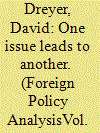

|
|
|
|
|
| Summary/Abstract |
Rather than competition over one issue or another (such as territory or status) leading to war, in this study it is argued that war is often likely the result of an issue spiral-a dynamic process in which tension increases as multiple issues accumulate. Once an initial issue disagreement is established, the development of enemy images may cause states to view the "other's" behavior and intentions in relation to additional issues as threatening. States may subsequently seek to gain an advantage on a new issue in order to prevent one's competitor from doing so, or in order to gain leverage on other issues. A state's aggressive actions in relation to new issues tend to reinforce their rival's perceptions that the state has aggressive intentions in relation to earlier established disagreements, further increasing tension. Issue accumulation, furthermore, increases the stakes of competition, which increases the likelihood that states will be willing to bear the costs of war seeking favorable issue settlement. As tension heightens and the rationality of engaging in large-scale militarized conflict increases, a state may initiate war if a rival presses its demands on an issue fearing that failure to demonstrate resolve will lead one's competitor to press its demands on other issues as well. An examination of relations between China and Vietnam in the 1970s reveals that an issue spiral, in which one issue led to another and the accumulation of issues contributed to the deterioration of relations, precipitated the 1979 Sino-Vietnamese War.
|
|
|
|
|
|
|
|
|
|
|
|
|
|
|
|
| 9 |
ID:
099756
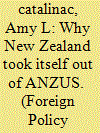

|
|
|
|
|
| Summary/Abstract |
In 1985, a dispute over nuclear ship visits led the United States to formally suspend its security guarantee to New Zealand under the trilateral ANZUS Treaty. In this article, I conceptualize this dispute as a case of intra-alliance opposition by a small state toward its stronger ally. I generate four hypotheses from the literature on alliances in international relations to explain why New Zealand chose to oppose its ally on the nuclear ships issue. Using new evidence, including interviews with 22 individuals involved in the dispute and content analysis of debates in the New Zealand parliament from 1976 to 1984, I conclude that a desire for greater autonomy in foreign policy was the driving factor behind New Zealand's opposition.
|
|
|
|
|
|
|
|
|
|
|
|
|
|
|
|
| 10 |
ID:
100266
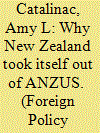

|
|
|
|
|
| Publication |
2010.
|
| Summary/Abstract |
In 1985, a dispute over nuclear ship visits led the United States to formally suspend its security guarantee to New Zealand under the trilateral ANZUS Treaty. In this article, I conceptualize this dispute as a case of intra-alliance opposition by a small state toward its stronger ally. I generate four hypotheses from the literature on alliances in international relations to explain why New Zealand chose to oppose its ally on the nuclear ships issue. Using new evidence, including interviews with 22 individuals involved in the dispute and content analysis of debates in the New Zealand parliament from 1976 to 1984, I conclude that a desire for greater autonomy in foreign policy was the driving factor behind New Zealand's opposition.
|
|
|
|
|
|
|
|
|
|
|
|
|
|
|
|
| 11 |
ID:
100268
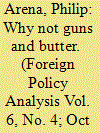

|
|
|
|
|
| Publication |
2010.
|
| Summary/Abstract |
Diversionary approaches rarely explain why leaders use force in response to economic turmoil rather than addressing the problem directly. Those few studies that do address this often assume leaders can either respond with foreign policy or economic policy, but not both. I develop a formal model in which governments may employ macroeconomic policy tools, enter into an international crisis, or both. The results indicate that the relationship between economic conditions and the decision to use force may be either positive or negative. I discuss the implications with respect to recent empirical studies of the link between economic conditions and international conflict.
|
|
|
|
|
|
|
|
|
|
|
|
|
|
|
|
| 12 |
ID:
099757


|
|
|
|
|
| Summary/Abstract |
Diversionary approaches rarely explain why leaders use force in response to economic turmoil rather than addressing the problem directly. Those few studies that do address this often assume leaders can either respond with foreign policy or economic policy, but not both. I develop a formal model in which governments may employ macroeconomic policy tools, enter into an international crisis, or both. The results indicate that the relationship between economic conditions and the decision to use force may be either positive or negative. I discuss the implications with respect to recent empirical studies of the link between economic conditions and international conflict.
|
|
|
|
|
|
|
|
|
|
|
|
|
|
|
|
|
|
|
|
|